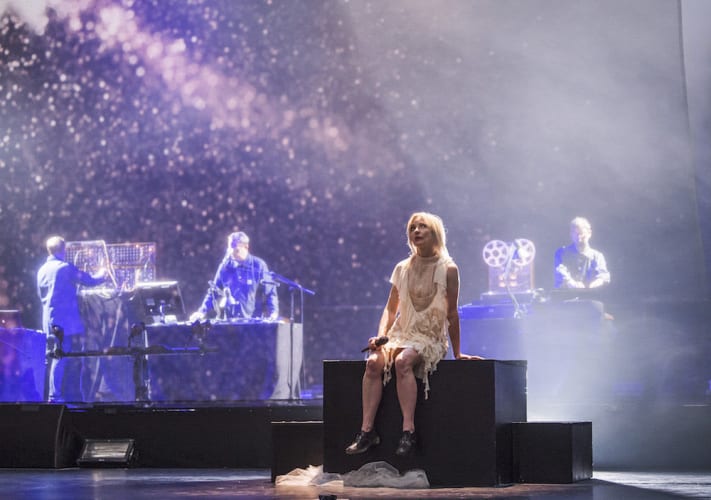Like Jimmy McGovern's King Cotton at The Lowry a decade ago, Cotton Panic! examines the relationship between the Lancashire cotton mills and the cotton growing trade of the US in the mid-nineteenth century, the latter fuelled by slavery.
I'm always suspicious of a title with an exclamation mark as it looks like it is trying to make up for something lacking in the performance. That is the case here, in a show that amounts to a collage of bits and pieces played which such over-earnestness it borders on parody.
It begins with some promise: the audience is stood in the large empty space of the Upper Campfield Market building with screens on either side of them and across the back of the stage, the latter a gauze that can reveal the 3-piece band behind with its keyboards and an array of plugs and cables in a wall of analogue synths and a reel-to-reel tape recorder. Cotton snows down all around us on the screens as the band creates a tense musical atmosphere.
Jane Horrocks appears through the audience (pushing us quite forcefully out of her way) and mounts the stage dressed in flowing white. She then delivers a collage of verse, contemporary accounts from Lancashire and USA, modern songs and traditional folk songs—some of the writing isn't that great, but it's all delivered as though it is brilliantly profound.
The thin dramatic thread that pops up now and again begins with the workers in the Lancashire mills then makes the link with the plantations in the Southern States where Lincoln is campaigning to end slavery. The Southern ports are blockaded, with the result that the cotton can't get to Lancashire and there is no work, therefore no pay, for the mill workers.
The people of Manchester crowd the Free Trade Hall to collaborate on a letter to Lincoln in support of his attempts to ban the slave trade, despite the effects it has on them. Lincoln responds with his thanks. The ending is backed with a film collage of recent events, including the face of Trump and Black Lives Matter demonstrations.
The constantly running film on three screens is slick and polished with some atmospheric imagery and a couple of monologues, one a compellingly delivered account of the poverty in a Manchester home spoken by Glenda Jackson. The songs are, of course, sung very well by Horrocks and include the Grace Jones hit "Slave to the Rhythm" (which she changes right at the end to "oh lordy, pick a bit of cotton"), The Clash's "White Riot" and a snatch of Billie Holiday's "Strange Fruit" sung through a megaphone.
During all of this, Horrocks cavorts about the stage, often with arm movements that suggest some kind of machine, puts on clogs, floats through the audience like a ghost repeating "can you help us a bit" to no one in particular before being carried back to the stage. Production values are high, but it doesn't seem to add up to very much at all.
Even down to the '80s fanzine-style photocopied programme, it all looks like a self-consciously "arty" scrapbook of ideas rather than a finished piece that delivers a clear message or story. I've no idea why we had to stand up for an hour and ten minutes, but it is carried off with a certain polish.
